文章目录
需求
今天在超市购物的时候,发现一个新的需求,能不能通过拍照识别的方式进行记账,于是开始行动,干起来。
分析
目标
- 对购物小票进行拍照,可以识别出购物的内容,并自动进行记账
- 能对购物内容进行分类,如小票记录,洗衣液, 冰淇淋,自动分类为生活用品, 餐饮支出
实现方法
- 进行小票的目标识别
- 获取小票内容,进行透视变换
- 运用ORC框架进行内容识别
- 利用文本分类网络进行分类
- 将数据存入数据库,前端展示
开始
进行小票区域检测识别
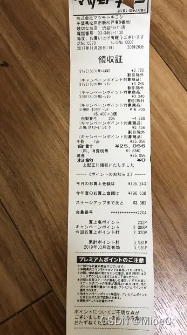
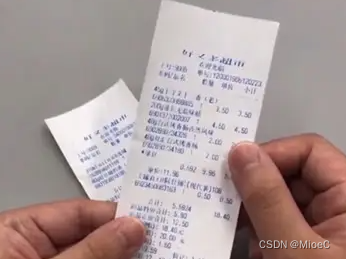
- 一般拍的不会那么正, 我们需要进行检测,执行透视变换,变成正的摆放
检测
-灰度化, 去噪, 边缘检测算法
img_gray = cv.cvtColor(img, cv.COLOR_BGR2GRAY)# ret, threshold = cv.threshold(img_gray, 177, 255, cv.THRESH_OTSU)
kernel = cv.getStructuringElement(cv.MORPH_RECT,(5,5))
img_gray = cv.erode(img_gray, kernel)
img_gray = cv.GaussianBlur(img_gray,(5,5),0)
res = cv.Canny(img_gray,75,200)
轮廓处理
- 运用轮廓
- 利用近似轮廓获取正方形选区,将区域最大的放入选区数组
- 绘制选区
# 获得近似轮廓
cnts, tre = cv.findContours(res, cv.RETR_LIST, cv.CHAIN_APPROX_SIMPLE)# 获得轮廓排序
cnts =sorted(cnts, key=cv.contourArea, reverse=True)[:5]for cnt in cnts:
peri = cv.arcLength(cnt,True)
approx = cv.approxPolyDP(cnt,0.01* peri,True)iflen(approx)==4:
screenCnt = approx
break
cv.drawContours(img,[screenCnt],-1,(0,255,0),2)
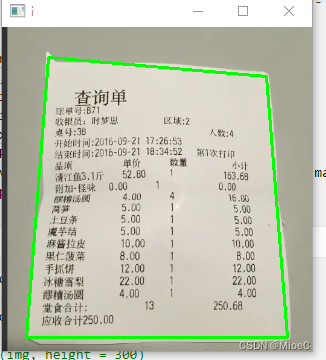
进行变换
- 主要运用opencv的透视变换
M = cv.getPerspectiveTransform(rect, dst)
warped = cv.warpPerspective(origin, M,(max_width, max_height))
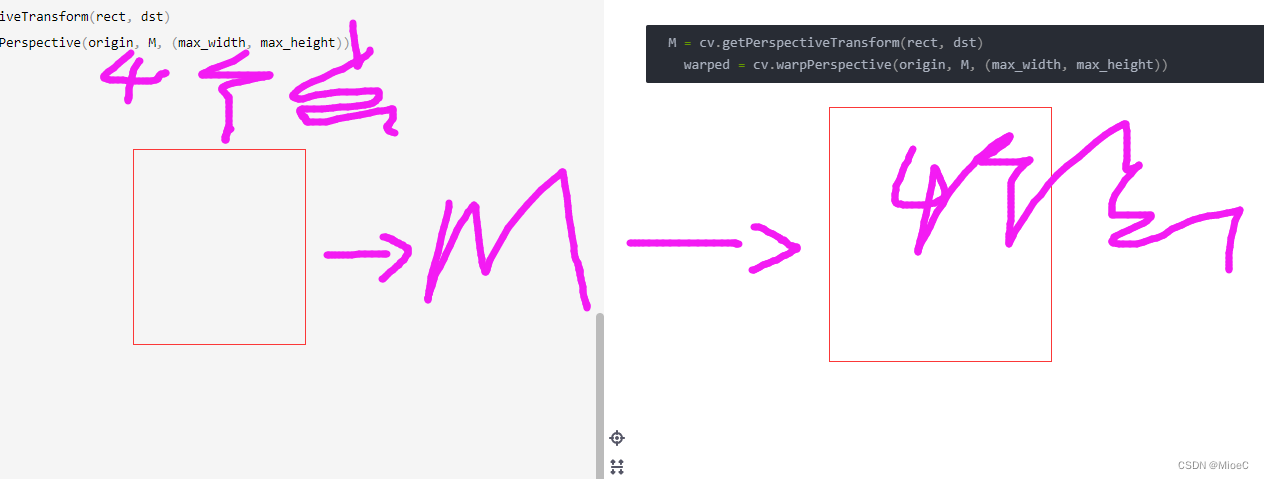
- 需要变换前和变换后的四个坐标点。
opencv的 透视变换
参考
M = cv.getPerspectiveTransform(rect, dst)
warped = cv.warpPerspective(origin, M,(max_width, max_height))
效果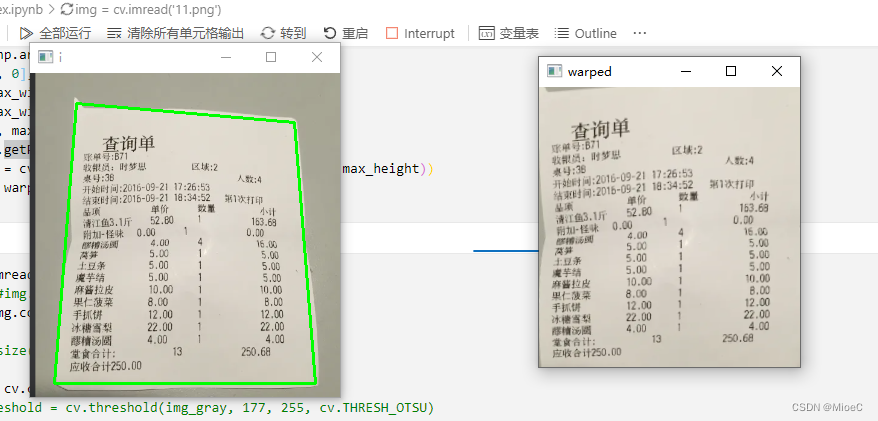
- 参考代码:
img = cv.imread('sudoku.png')
rows,cols,ch = img.shape
pts1 = np.float32([[56,65],[368,52],[28,387],[389,390]])
pts2 = np.float32([[0,0],[300,0],[0,300],[300,300]])
M = cv.getPerspectiveTransform(pts1,pts2)
dst = cv.warpPerspective(img,M,(300,300))
plt.subplot(121),plt.imshow(img),plt.title('Input')
plt.subplot(122),plt.imshow(dst),plt.title('Output')
plt.show()
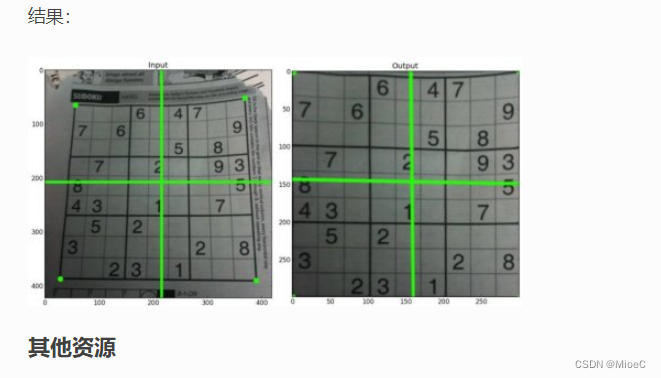
下一步
进行OCR框架安装和文字识别
代码
# %%import cv2 as cv
import numpy as np
# %%defresize(img, height=None, width=None):
target =None(h, w)= img.shape[:2]if height ==Noneand width ==None:return img
if height:
w =int(w *(height/float(h)))else:
h =int(h *(width/float(w)))
target = cv.resize(img,(w, h), interpolation= cv.INTER_AREA)return target
# %%deforder_point(target):
rect = np.zeros((4,2), dtype='float32')print(target)
s = target.sum(axis =1)
rect[0]= target[np.argmin(s)]
rect[2]= target[np.argmax(s)]
diff = np.diff(target, axis=1)
rect[1]= target[np.argmin(diff)]
rect[3]= target[np.argmax(diff)]return rect
# %%deftransform(origin, target):
rect = order_point(target)(tl, tr, br, bl)= rect;
width_A = np.sqrt(((tr[0]- tl[0])**2)+((tr[1]- tl[1])**2))
width_B = np.sqrt(((br[0]- bl[0])**2)+((br[1]- bl[1])**2))
max_width =max(int(width_A),int(width_B))
height_A = np.sqrt(((tr[0]- br[0])**2)+((tr[1]- br[1])**2))
height_B = np.sqrt(((tl[0]- bl[0])**2)+((tl[1]- bl[1])**2))
max_height =max(int(height_A),int(height_B))
dst = np.array([[0,0],[max_width -1,0],[max_width -1, max_height -1],[0, max_height]], dtype='float32')
M = cv.getPerspectiveTransform(rect, dst)
warped = cv.warpPerspective(origin, M,(max_width, max_height))return warped
# %%
img = cv.imread('11.png')
ratio =1#img.shape[0] / 300 # h/500 ,高度比例
origin = img.copy()# img = resize(img, height = 300)
img_gray = cv.cvtColor(img, cv.COLOR_BGR2GRAY)# ret, threshold = cv.threshold(img_gray, 177, 255, cv.THRESH_OTSU)
kernel = cv.getStructuringElement(cv.MORPH_RECT,(5,5))
img_gray = cv.erode(img_gray, kernel)
img_gray = cv.GaussianBlur(img_gray,(5,5),0)
res = cv.Canny(img_gray,75,200)# 获得近似轮廓
cnts, tre = cv.findContours(res, cv.RETR_LIST, cv.CHAIN_APPROX_SIMPLE)# 获得轮廓排序
cnts =sorted(cnts, key=cv.contourArea, reverse=True)[:5]for cnt in cnts:
peri = cv.arcLength(cnt,True)
approx = cv.approxPolyDP(cnt,0.01* peri,True)iflen(approx)==4:
screenCnt = approx
break
cv.drawContours(img,[screenCnt],-1,(0,255,0),2)
warped = transform(origin, screenCnt.reshape(4,2)* ratio)
cv.imshow("origin", origin)
cv.imshow("i", img)
cv.imshow("warped", warped)
cv.waitKey(0)
cv.destroyAllWindows()
本文转载自: https://blog.csdn.net/monk96/article/details/125845345
版权归原作者 MioeC 所有, 如有侵权,请联系我们删除。
版权归原作者 MioeC 所有, 如有侵权,请联系我们删除。